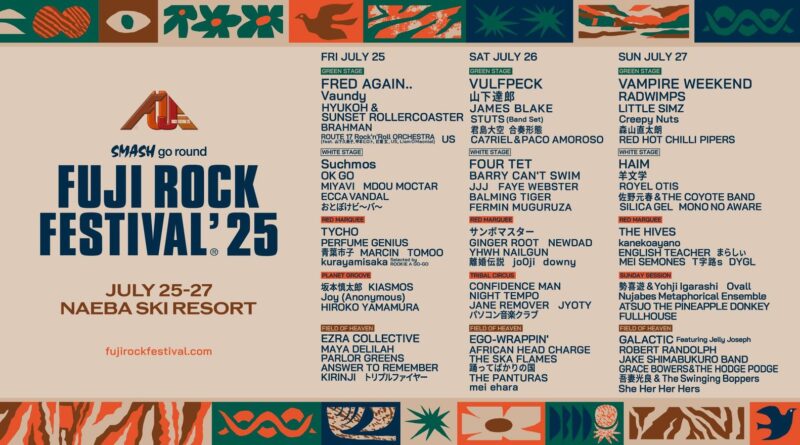Fuji Rock Festival:The Ultimate Guide 2025
Fuji Rock Festival: The Ultimate 2025 Guide
Focus Keyword: Fuji Rock Festival
Introduction to Fuji Rock Festival
The Fuji Rock Festival is one of the largest and most celebrated outdoor music festivals in Asia.
Held annually in Japan, it attracts thousands of fans from around the world. Known for its breathtaking
mountain setting, diverse lineups, and vibrant atmosphere, Fuji Rock is not just a concert—it’s an experience.
This 5000-word pillar article will serve as the ultimate guide, covering everything from the festival’s history,
stages, and performers, to travel tips, ticket information, and sustainability practices.
The History of Fuji Rock Festival
First launched in 1997, Fuji Rock Festival started as an ambitious project aiming to bring international
music culture to Japan. Its first edition took place at the base of Mount Fuji, hence the name.
Despite challenges such as typhoons in the early years, Fuji Rock quickly established itself as a major
cultural event. Since 1999, the festival has been held at Naeba Ski Resort in Niigata Prefecture,
offering a unique blend of nature and live music.
Over the decades, Fuji Rock has hosted legendary acts such as Red Hot Chili Peppers, Radiohead,
Foo Fighters, Beck, and Björk. It has also been a stage for rising Japanese artists, making it a
hub for international and domestic talent.
Location and Venue
The current home of Fuji Rock Festival, Naeba Ski Resort, is nestled in the mountains of Niigata.
The venue is famous for its lush forests, flowing rivers, and open-air setting that harmonizes with
the sounds of music. Unlike urban festivals, Fuji Rock immerses its audience in nature, making it a
truly one-of-a-kind event.
- Address: Naeba Ski Resort, Yuzawa Town, Niigata Prefecture, Japan
- Nearest City: Tokyo (approx. 90 minutes by Shinkansen)
- Accessibility: Shuttle buses and train connections from major hubs
Stages and Festival Layout
Fuji Rock Festival boasts multiple stages, each with its own unique atmosphere:
- Green Stage: The main stage, hosting world-famous headliners.
- White Stage: Known for diverse international and Japanese acts.
- Red Marquee: Indoor stage, perfect for late-night performances.
- Field of Heaven: Surrounded by nature, offering a mystical experience.
- Gypsy Avalon: Eco-conscious stage focusing on sustainability.
With over a dozen performance spaces, art installations, and food stalls, the festival grounds feel
like a temporary city of music lovers.
Fuji Rock Festival Lineups Through the Years
One of Fuji Rock’s greatest strengths is its consistently impressive lineup. From rock and pop to
electronic, folk, and jazz, the festival’s diverse programming appeals to a wide audience.
Past lineups have included:
- Radiohead
- Red Hot Chili Peppers
- Foo Fighters
- The Cure
- Kendrick Lamar
- Beck
- Björk
- Coldplay
Tickets and Pricing
Tickets for Fuji Rock Festival are available in various packages:
- Single-Day Ticket: Ideal for those who can only attend one day.
- 3-Day Pass: Offers access to the full festival experience.
- Camping Pass: For attendees staying on-site in the camping areas.
- Shuttle and Travel Packages: Including transport from Tokyo and nearby cities.
Prices vary depending on the stage of purchase (early-bird, advance, or general sale). It’s highly
recommended to buy tickets early, as Fuji Rock often sells out.
Travel Tips for International Visitors
Attending Fuji Rock as an international traveler is an unforgettable adventure. Here are some tips:
- Arrival: Fly into Tokyo (Narita or Haneda Airport), then take the Shinkansen to Echigo-Yuzawa Station.
- Shuttle Buses: From Echigo-Yuzawa Station, shuttle buses connect to the festival site.
- Accommodation: Options include camping, local hotels, and ryokan (Japanese inns).
- Packing: Bring rain gear, hiking shoes, a portable charger, and eco-friendly items.
Eco-Friendly and Sustainability Practices
Fuji Rock is renowned for being one of the most eco-conscious music festivals in the world.
The organizers focus on sustainability, encouraging recycling, reusable containers, and
minimizing environmental impact.
Initiatives include:
- Waste sorting and recycling stations throughout the venue.
- Solar-powered stages such as the Gypsy Avalon.
- Encouraging attendees to bring their own reusable bottles and utensils.
Food and Drinks
Food is an integral part of the Fuji Rock experience. The festival offers a wide selection of
Japanese and international cuisine, including vegan and vegetarian options. From ramen and sushi
to pizza and curries, there’s something for everyone.
Fuji Rock Festival Culture
Beyond the music, Fuji Rock has cultivated a unique culture of respect, cleanliness, and
community. Unlike many festivals worldwide, Fuji Rock attendees are known for their politeness
and responsible behavior. The festival grounds remain remarkably clean thanks to the collaborative
spirit of the audience.
Why Fuji Rock Stands Out Globally
While festivals like Glastonbury, Coachella, and Lollapalooza dominate the global scene,
Fuji Rock offers a different perspective—an intimate connection with nature combined with
international music culture. Its stunning mountain location, eco-conscious practices, and
diverse lineup make it a must-visit festival for any music enthusiast.
Tips for First-Time Attendees
- Buy tickets early to avoid disappointment.
- Pack for all weather conditions—sun, rain, and cool mountain nights.
- Download the Fuji Rock app for maps and schedule updates.
- Respect the environment and follow recycling rules.
- Stay hydrated and pace yourself for three days of music.
Future of Fuji Rock Festival
As music evolves, so does Fuji Rock. With increasing international attention and dedication
to eco-friendly practices, the festival’s future looks brighter than ever. It is likely to
continue attracting major global artists while providing a platform for emerging Japanese talent.
Conclusion
The Fuji Rock Festival is more than just a music event—it’s a cultural phenomenon
blending art, nature, and community. From its origins at the base of Mount Fuji to its current
home in Naeba, it has remained a beacon of creativity, sustainability, and global unity.
Whether you’re a first-time visitor or a returning fan, Fuji Rock offers an unforgettable journey
into the heart of Japan’s music culture.
